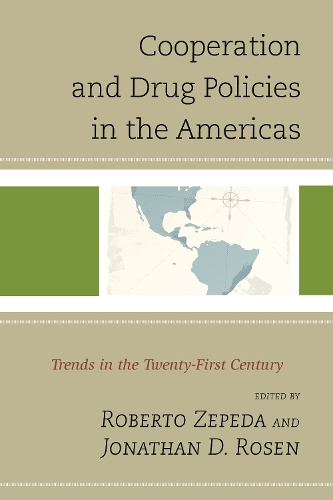
Cooperation and Drug Policies in the Americas: Trends in the Twenty-First Century
(Hardback)
Available Formats
Publishing Details
Cooperation and Drug Policies in the Americas: Trends in the Twenty-First Century
By (Author) Roberto Zepeda
Edited by Jonathan D. Rosen
Edited by Jonathan D. Rosen
Contributions by Marlon Anatol
Contributions by Astrid Arrars
Contributions by Emily D. Bello-Pardo
Contributions by Lilian Bobea
Contributions by Ted Galen Carpenter
Contributions by Brian Fonseca
Contributions by Jean-Claude Garcia-Zamor
Bloomsbury Publishing PLC
Lexington Books
18th December 2014
United States
Classifications
Professional and Scholarly
Non Fiction
Constitution: government and the state
Central / national / federal government policies
Social welfare, social policy and social services
361.25
Physical Properties
Hardback
272
Width 163mm, Height 239mm, Spine 26mm
535g
Description
This volume examines drug policies and the role of cooperation in the Americas. Many current and former politicians have discussed the failures of the war on drugs and the need for alternative approaches. Uruguay as well as Colorado and Washington have legalized marijuana. The Organization of American states produced a report in 2013 which discussed alternative policy options to the drug war. This work examines the nature of cooperation and drug policies in the twenty-first century in the Americas, highlighting the major challenges and obstacles. The argument is that one country cannot solve drug trafficking as it is a transnational problem. Therefore, the producing, consuming, and transit countries must work together and cooperate.
Reviews
The book remains very interesting and [will] certainly attract the attention of researchers working on the problem of illicit drugs in the Americas. * Etudes Internationales *
This book takes on a fast-moving topic at a fascinating time. After far too many disappointing results and ruined lives, the ice freezing global drug policy in its mid-20th century form has begun to thaw. In another historic break, Latin America is leading the way while Washington watches. The contributors to Cooperation and Drug Policies in the Americas are some of the brightest analysts of Latin American politics and drug policy today. Contributing from a variety of disciplines, they capture this remarkable moment well. Most importantly, they do so by capturing its complexity: the geographic variation, the shifting power balances, the troubled historical legacy, the complicated menu of policy options, and the exciting ideas being debated throughout the region. I hope this book finds its way to the desks of policymakers worldwide. -- Adam Isacson, Washington Office on Latin America
This timely and informative volume helps us make sense of both continuity and change in the politics of drugs and drug control in the Americas. Highly recommended for anyone looking for an up-to-date primer on one of the most contentious issues in inter-American relations. -- Peter Andreas, Brown University
Author Bio
Jonathan D. Rosen is research professor at the Institute of International Studies at the Universidad del Mar, Mexico. Roberto Zepeda is research professor at the Institute of International Studies at the Universidad del Mar, Mexico.
